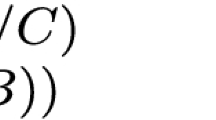Abstract
Starting with the deontic principles in Mīmāṃsā texts we introduce a new deontic logic. We use general proof-theoretic methods to obtain a cut-free sequent calculus for this logic, resulting in decidability, complexity results and neighbourhood semantics. The latter is used to analyse a well known example of conflicting obligations from the Vedas.
Supported by FWF START project Y544-N23, FWF project V400 and EU H2020-MSCA grant 660047.
Access this chapter
Tax calculation will be finalised at checkout
Purchases are for personal use only
Preview
Unable to display preview. Download preview PDF.
Similar content being viewed by others
References
Abraham, M., Gabbay, D.M., Schild, U.: Obligations and Prohibitions in Talmudic Deontic Logic. Artificial Intelligence and Law 2-3, 117–148 (2011)
Blackburn, P., de Rijke, M., Venema, Y.: Modal Logic. Cambridge University Press (2001)
Chaudhuri, S., Vardi, M.: Reasoning about machine ethics. POPL-OBT (2014)
Chellas, B.F.: Modal Logic. Cambridge University Press (1980)
Freschi, E.: Duty, language and exegesis in Prābhākara Mīmāṃsā. Jerusalem Studies in Religion and Culture, vol. 17, Brill (2012)
Freschi, E., Ciabattoni, A., Genco, F.A., Lellmann, B.: Understanding prescriptive texts: rules and logic elaborated by the Mīmāṃsā school. International Conference on Philosophy ATINER (2015)
Gabbay, D.M., Horty, J., Parent, X. (eds.): Handbook of Deontic Logic and Normative Systems, vol. 1. College Publications (2013)
Ganeri, J.: Towards a formal representation of the Navya-Nyāya technical language. In: Logic, Navya-Nyāya & Applications, pp. 109–124. College Publications (2008)
Goble, L.: Prima facie norms, normative conflicts, and dilemmas. In: Gabbay et al. [7], pp. 241–351
Goré, R.: Tableau methods for modal and temporal logics. In: D’Agostino, M., Gabbay, D.M., Hähnle, R., Posegga, J. (eds.) Handbook of Tableau Methods, pp. 297–398. Kluwer, Dordrecht (1999)
Hilpinen, R.: Deontic logic. In: Goble, L. (ed.) The Blackwell Guide to Philosophical Logic, pp. 159–182. Blackwell, Malden (2001)
Indrzejczak, A.: Sequent calculi for monotonic modal logics. Bull. Sect. Log. 34(3), 151–164 (2005)
Kane, P.V.: History of Dharmaśāstra. Ancient an Mediaeval Religious and Civil Law in India, vol. 2. Bhandarkar Oriental Research Institute (1962)
Kleene, S.C.: Introduction to Metamathematics. North-Holland (1952)
Lellmann, B.: Sequent Calculi with Context Restrictions and Applications to Conditional Logic. Ph.D. thesis, Imperial College London (2013), http://hdl.handle.net/10044/1/18059
Lellmann, B., Pattinson, D.: Constructing cut free sequent systems with context restrictions based on classical or intuitionistic logic. In: Lodaya, K. (ed.) Logic and Its Applications. LNCS (LNAI), vol. 7750, pp. 148–160. Springer, Heidelberg (2013)
Orlandelli, E.: Proof analysis in deontic logics. In: Cariani, F., Grossi, D., Meheus, J., Parent, X. (eds.) DEON 2014. LNCS(LNAI), vol. 8554, pp. 139–148. Springer, Heidelberg (2014)
Stcherbatsky, T.I.: Über die Nyāyakaṇikā des Vācaspatimiśra und die indische Lehre des kategorischen Imperativ. In: Kirfel, W. (ed.) Beiträge zur Literaturwissenschaft und Geistesgeschichte Indiens. Festgabe Hermann Jacobi zum 75, Geburtstag, pp. 369–380. Kommissionsverlag F. Klopp, Bonn (1926)
Author information
Authors and Affiliations
Corresponding author
Editor information
Editors and Affiliations
Rights and permissions
Copyright information
© 2015 Springer International Publishing Switzerland
About this paper
Cite this paper
Ciabattoni, A., Freschi, E., Genco, F.A., Lellmann, B. (2015). Mīmāṃsā Deontic Logic: Proof Theory and Applications. In: De Nivelle, H. (eds) Automated Reasoning with Analytic Tableaux and Related Methods. TABLEAUX 2015. Lecture Notes in Computer Science(), vol 9323. Springer, Cham. https://doi.org/10.1007/978-3-319-24312-2_22
Download citation
DOI: https://doi.org/10.1007/978-3-319-24312-2_22
Published:
Publisher Name: Springer, Cham
Print ISBN: 978-3-319-24311-5
Online ISBN: 978-3-319-24312-2
eBook Packages: Computer ScienceComputer Science (R0)




